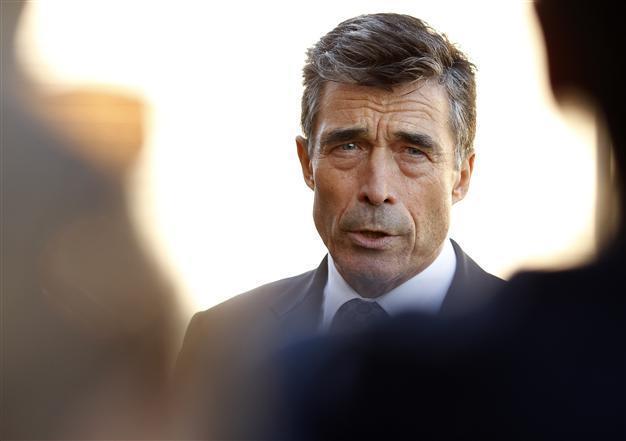NATO chief regrets divisions over Syria, calls for 'firm international response'
VILNIUS - Agence France-Presse

Secretary General Anders Fogh Rasmussen talks with journalists as he arrives for an Informal meeting of EU Ministers of Defense at the National Art Gallery in Vilnius, Sept. 5. AP photo
NATO chief Anders Fogh Rasmussen sharply regretted international divisions over Syria on Sept. 5, warning that such splits risked sending a message of encouragement to dictators accross the globe to use prohibited deadly weapons."I strongly regret that division within the international community," Rasmussen told AFP on the sidelines of an EU defense ministers' meeting taking place in Lithuania as the United States and Russia sought to overcome divisions over a U.S.-led push for military action against the Damascus regime.
"It sends a very dangerous signal to dictators all over the world that they can use chemical weapons and maybe other weapons of mass destruction without any reaction from the international community," he added.
Rasmussen called for "a firm international response", insisting he was confident Syrian President Bashar al-Assad's regime was responsible for chemical weapons attacks on the outskirts of Damascus on August 21 which killed hundreds.
EU ministers started talks Sept. 5 in Lithuania, current holder of the rotating European Union presidency, as US President Barack Obama, Russian President Vladimir Putin and other world leaders were convening at a G20 gathering in Russia.
"We're all looking to St. Petersburg. That's now the forum for important decisions," German Defense Minister Thomas de Maiziere told reporters.
Syria will also be at the heart of an EU foreign ministers gathering in Vilnius on Friday and Saturday that threatens to highlight more divisions with France standing alone in the 28-nation bloc in favour of military intervention.
The sceptics say any retaliatory strike could have dangerous consequences and stress the need for a proper legal justification to use force from the United Nations.
Rasmussen admitted it "seemed to be difficult" to find an agreement in the UN Security Council, where Russia and China have veto-wielding permanent membership, but said the military action could be justified.
"If individual nations were to respond militarily, it would be in defence of international conventions that clearly ban the use of chemical weapons," he said.
U.S. Secretary of State John Kerry is due to join EU counterparts on Sept. 5 in Lithuania.
















